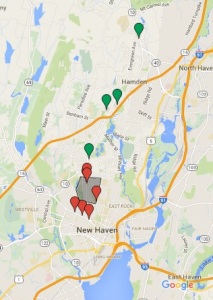By Melissa Barclay
When was the last time you went to the grocery store? How long did it take you? What was your mode of transportation?

For many Americans, a trip to the grocery store is a leisurely task. But for others living in areas designated as “food deserts,” access to healthy food is limited. Instead of having access to nutritious food, residents are surrounded by fast food joints that are cheap and convenient but unhealthy.
Some sections in New Haven have been designated as food deserts by the United States Department of Agriculture (USDA).
Based on the CARE 2015 health survey, hunger rates within the city’s six lowest-income neighborhoods soar up to 40 percent. In addition to that, 7 out of 10 residents are considered overweight or obese due to the lack of nutritious food in their diet.
To try and address this issue, the New Haven Food Policy Council has created a new position – food system director – which will be responsible for coordinating events raising awareness about the issue.
According to the job posting for the position, the food director will be responsible for creating and implanting strategies that will decrease the lack of access to healthy food within New Haven and serve as a liaison between the city and the New Haven Food Policy Council.
The position has yet to be filled.
Resident Joanne Ndiaye and her family have struggled without convenient access to a local supermarket.
“[I’m] no stranger to the task of trying to keep a balanced, healthy meal on the table,” she said.
Ndiaye has been a resident of the Hill section of New Haven for the last 10 years. She is also a single mother of five children, and a beneficiary of the SNAP program.
SNAP stands for Supplemental Nutrition Assistance Program. It is a government program providing food stamps to families who qualify.
“Like so many other families, we depend on SNAP benefits and food pantries to make ends meet from month to month,” Ndiaye said. “There were times we were left to eat foods that were not balanced and healthy.”
Public transportation is an issue in New Haven’s Newhallville neighborhood. city buses do not travel directly to the supermarkets, and some residents have to transfer to another bus to get there and back.
In order to get to the nearest grocery store, Save-A-Lot in Hamden, most residents have to travel about a mile and a half. But fast-food joints, such as Chinese food restaurants, are located within walking distance in the neighborhood.
Melissa Barclay is a senior journalism student at Quinnipiac University. She is writing about food deserts this spring. She can be reached at melissa.barclay@quinnipiac.edu.
